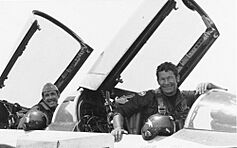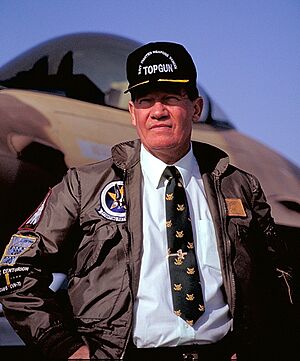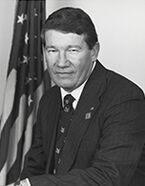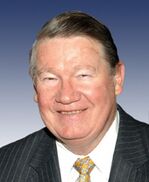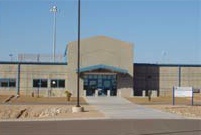Duke Cunningham facts for kids
Quick facts for kids
Duke Cunningham
|
|
|---|---|
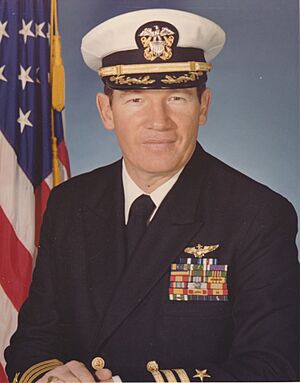 |
|
| Member of the U.S. House of Representatives from California |
|
| In office January 3, 1991 – December 1, 2005 |
|
| Preceded by | Jim Bates |
| Succeeded by | Brian Bilbray |
| Constituency | 44th district (1991–1993) 51st district (1993–2003) 50th district (2003–2005) |
| Personal details | |
| Born |
Randall Harold Cunningham
December 8, 1941 Los Angeles, California, U.S. |
| Died | August 27, 2025 (aged 83) Little Rock, Arkansas, U.S. |
| Political party | Republican |
| Spouses |
|
| Children | 3 |
| Education |
|
| Military service | |
| Allegiance | |
| Branch | |
| Service years | 1967–1987 |
| Rank | Commander |
| Conflict | Vietnam War |
| Awards |
|
Randall Harold "Duke" Cunningham (born December 8, 1941, died August 27, 2025) was an American politician and a brave pilot during the Vietnam War. He was known as a "fighter ace" because he shot down five enemy aircraft. As a member of the Republican Party, Cunningham represented different areas of California in the United States House of Representatives from 1991 to 2005. Later in his life, he faced legal challenges for misusing his position.
Contents
Who Was Duke Cunningham?
Before becoming a politician, Duke Cunningham served in the United States Navy for 20 years. He was an officer and a skilled pilot. After the Vietnam War, he became an instructor at the Navy's famous Fighter Weapons School, also known as TOPGUN. He also led Fighter Squadron 126 (VF-126).
In 1990, Cunningham decided to run for the U.S. House of Representatives. He won the election and served in Congress for many years. However, he resigned from his position in 2005 after admitting to breaking the law by accepting improper gifts and favors. He was sentenced to prison and later completed his sentence in 2013. In 2021, he received a special pardon from President Donald Trump.
Early Life and School Days
Duke Cunningham was born in Los Angeles, California, on December 8, 1941. His father worked as a truck driver. His family moved a few times, eventually settling in rural Shelbina, Missouri, where his parents owned a store.
He finished high school in 1959. Cunningham then went to college, first at Kirksville Teacher's College and later at the University of Missouri. He earned a bachelor's degree in education and physical education in 1964, and a master's degree the next year. He also earned an MBA from National University. Before his military career, he worked as a physical education teacher and swimming coach at Hinsdale Central High School. Two of his swim team members even competed in the 1968 Summer Olympics!
A Hero in the Sky: Military Service
Cunningham joined the United States Navy in 1967. During the Vietnam War, he and his navigator, William P. Driscoll, became the only Navy "aces." This means they were the only Navy pilots to shoot down five enemy aircraft during the war. They flew an F-4 Phantom II jet from the aircraft carrier USS Constellation (CV-64).
Between January and May 1972, Cunningham and Driscoll achieved five aerial victories against North Vietnamese MiG-21 and MiG-17 planes. They even shot down three enemy planes in a single flight, which earned them the Navy Cross award. In their final battle, Cunningham shot down a MiG-17. While returning to their ship, their F-4 jet was damaged, and they had to eject over the water. Luckily, a Navy helicopter rescued them.
Becoming a TOPGUN Instructor
After returning to the U.S. in 1972, Cunningham became an instructor at the U.S. Navy's famous Fighter Weapons School, known as TOPGUN. This school trains the best fighter pilots. He later served as an executive officer and commanding officer of Fighter Squadron 126 (VF-126). Cunningham retired from the Navy in 1987 with the rank of commander. He became well-known as a commentator on CNN, sharing his knowledge about naval aircraft.
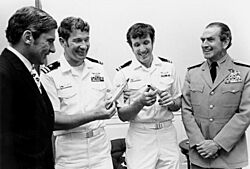
June 1972 ceremony honoring Cunningham and Driscoll for their service in the Vietnam War.
Serving in Congress: A Political Journey
Duke Cunningham's public profile as a CNN commentator led Republican leaders to suggest he run for Congress. In 1990, he ran for the U.S. House of Representatives in California's 44th district. He won the election, becoming a representative for the San Diego area.
As a Vietnam War hero, Cunningham was often asked for his opinions on military matters. He served on important committees, including the Appropriations and Intelligence committees. He was seen as a leading expert on national security. He also cared deeply about education and worked to bring federal money to schools in San Diego. After having surgery for prostate cancer in 1998, he became a strong supporter of early testing for the disease.
Cunningham was known for making some controversial comments during his time in office. He sometimes spoke out strongly against people or ideas he disagreed with.
Important Laws and Actions
Cunningham was a key supporter of several important laws:
- Shark Finning Prohibition Act: This law made it illegal to remove shark fins in all U.S. waters. He wanted America to lead the way in stopping this practice worldwide. For his efforts, he was recognized as a "Conservation Hero."
- Flag Desecration Amendment: He co-sponsored an amendment that would give Congress the power to prohibit the physical desecration of the Flag of the United States. This amendment aimed to protect the flag from disrespect.
- Law Enforcement Officers Safety Act: This law, passed in 2004, allowed non-federal law enforcement officers to carry a firearm anywhere within the United States.
Facing Challenges and Legal Issues
Towards the end of his time in Congress, Duke Cunningham faced serious questions about his actions. In 2005, news reports revealed that he had accepted valuable gifts and favors from people who wanted his help getting government contracts. This was against the rules for public officials and was a serious misuse of his position.
Reports showed that a defense contractor bought Cunningham's house for a very high price. Soon after, that contractor's company received many government contracts worth millions of dollars. Cunningham also lived on a yacht owned by this contractor without paying rent. These actions led to an investigation by federal authorities, including the Federal Bureau of Investigation.
Resignation and Time in Prison
On November 28, 2005, Duke Cunningham admitted that he had broken the law by accepting these gifts and misusing his public office. He resigned from Congress, saying he was "deeply sorry" for his actions and had "disgraced his high office."
On March 3, 2006, a judge sentenced Cunningham to eight years and four months in prison. This was one of the longest prison terms ever given to a former Congressman. He was sent to a prison in Tucson, Arizona. While in prison, he taught other inmates to earn their GED (a high school equivalency diploma).
Life After Prison
Duke Cunningham was released from prison in February 2013 and completed his sentence on June 4, 2013. He planned to live in Arkansas. On January 13, 2021, President Donald Trump granted him a special pardon. This pardon was conditional on him paying back money he owed due to his legal issues.
The journalists who uncovered Cunningham's story, from The San Diego Union-Tribune and Copley News Service, were awarded the 2006 Pulitzer Prize for National Reporting for their important investigative work.
Personal Life
Duke Cunningham married Susan Albrecht in 1965, and they adopted a son. They later divorced in 1973. In 1974, he married his second wife, Nancy Jones. They had two daughters and separated in 2005. Duke Cunningham died on August 27, 2025, in Little Rock, Arkansas, at the age of 83.
Images for kids
 | Percy Lavon Julian |
 | Katherine Johnson |
 | George Washington Carver |
 | Annie Easley |


